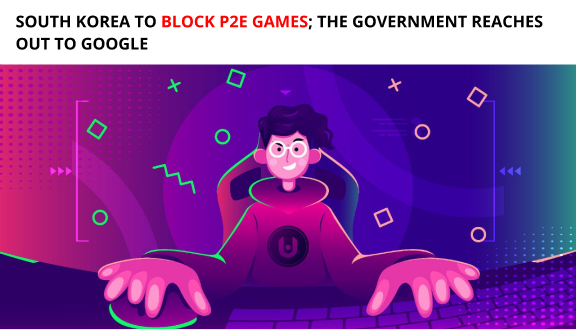Key Takeaways
- The South Korean government has begun to prohibit the release of so-called “money-making games” ( P2E ).
- They have requested that global app marketplace operators such as Google and Apple block the registration of related apps, according to reports.
- The Game Management Committee under the Ministry of Culture, Sports and Tourism recently sent an official letter to game-related self-classifying operators.
- The letter was sent to block the domestic distribution of games that can obtain cash and goods in advance.

The South Korean government has redoubled its efforts to establish itself as the world’s leading crypto regulator. Authorities have this time focused on the NFT phenomenon of P2E games. The South Korean government has begun to prohibit the release of so-called “money-making games” (P2E). They have requested that global app marketplace operators such as Google and Apple block the registration of related apps, according to reports. The government has recently stepped up its monitoring of blockchain games, and the opposition from game developers is expected to grow.
According to the information technology (IT) industry on 27th December, the Game Management Committee under the Ministry of Culture, Sports and Tourism recently sent an official letter to game-related self-classifying operators. The letter was sent to block the domestic distribution of games that can obtain cash and goods in advance. It shows the will to block the source from the first stage of game distribution, app registration.
The government even came up with a way to ask for platform cooperation because it was judged that the number of ‘speculative money-making games’ using the ‘pre-release, post-approval system is increasing. In order for game companies to release games in Korea, they must first receive approval from the Game Management Committee, which determines the appropriate age for the game based on the content. If a game is released through an in-house grading service provider, the game company must rate the game.
Recent games have been purchased using the same self-classification system P2E, with a game after another based on the domestic market, with its own classification system P2E believing that the government does not prevent the game from being released. The Game Commission forbids the distribution of P2E games in Korea, citing the Game Industry Promotion Act’s “prohibition of prizes.”
Conflicts between the government and game companies are on the rise. P2E mobile games were also released this year by domestic game companies such as ‘Five Stars for Clayton’ and ‘Infinite Breakthrough Three Kingdoms Reverse.’ Gaming is a peer-to-peer activity. When a game was discovered, it requested that the self-classifying service provider block the game. The ‘Five Stars for Clayton’ rating was canceled in April. The game company was also recently notified that the rating for ‘Infinite Breakthrough Three Kingdoms Reverse’ had been canceled.
Companies that make video games are also launching a counter-offensive. The developer of ‘Five Stars for Clayton,’ SkyPeople, won an injunction lawsuit against the Game Board’s administrative disposition in June. The game can be distributed until the main lawsuit’s outcome is known. The developer of ‘Infinite Breakthrough Three Kingdoms Reverse,’ Natris, intends to bring up the same point.
The Game Commission anticipates a reduction in the number of ‘chasing and chased’ disputes if P2E game registration is prohibited. A Game Committee official said that “If you look at the Supreme Court precedent, P2E games cannot be graded under the current law because game items with cash properties can be considered prizes. It seemed reasonable to me.” Some self-rating companies, such as Google, are known to have reached an agreement with the Game Commission ahead of time.
The Game Committee has recently strengthened the monitoring of blockchain games. The Game Committee has decided to cancel the classification of more than 15 blockchain games this year. The game industry strongly opposes the government’s move. It is pointed out that this is a global trend that treats P2E games as new food and a policy that goes backward.
Virtual private network ( VPN) that helps to access overseas internet networks) can be used to play overseas P2E games, which makes the regulation less effective. An official from the game industry predicted, “If there is no legal basis for blockchain games, chaos will continue until the court’s ruling on the first related lawsuit, ‘Five Stars for Clayton’, is issued.”








